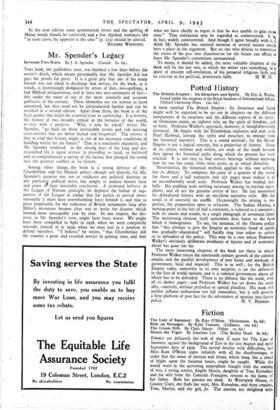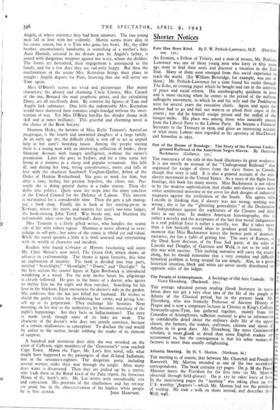Fiction
The Last of Summer. By Kate O'Brien. (Heinemann. 85.6d.) Ride on Stranger. By Kylie Tennant. (Gollancz. tos. 6d.) The Green Orb. By Chris Massie. (Faber. 7s. 6d.)
Mama the Tiger. By Jonathan Lee. (The Bodley Head. 8s. 6d.) FIRMLY yet delicately the web of time i; spun for The Last of Summer, against the background of Eire in the late August and early September days of x939. The period bristles with difficulties, but Miss Kate O'Brien copes valiantly with all the disadvantages in order that the sense of \tension and threat, which hang like a cloud of blight upon the haunted hours, might be caught. While the world waits in the quivering atmosphere fraught with the coming of war, a young actress, Angele Maury, daughter of Torn Kernahan and his wife from the Comedic Francaise, returns to the home of her father. Both her parents are dead. At Waterpark House, in County Clare, she finds her aunt, Mrs. Kernahan, and three cousins. Tom, Martin, and the girl, Jo. The cousins are delighted 'with
Angele, of whose existence they had been unaware. The two young men fall in love with her violently. Martin seems more akin to his exotic cousin, but it is Torn who gains her heart. He, the elder brother, unconsciously handsome, is something of a mother's boy. Aunt Hannah, scorned in the distant past by Angele's father, is armed with dangerous weapons against her n:ecc, whom she dislikes. The lovers are betrothed, their engagement is announced to the family, and for a few days they are rad:andy happy. But then the machinations of the astute Mrs. Kemahan brings their plans to naught: Angele departs for Paris, knowing that she will never see Tom again. • Miss O'Brien's scenes are vivid and picturesque. Her minor characters; the absurd and charming Uncle Corney, Mrs. Cusack of the inn, Bernard the mad prophetic priest, and the calculating Dotey, are all excellently done. By contrast the figures of Torn and Angele lack substance. One feels the indomitable Mrs. Kemahan would have shattered their romance single-handgcl without the intervention of war. Yet Miss O'Brien haniles her slender theme with skill and at times brilliance. This graceful and charming novel is the choice of the Book Soc:ety.
Shannon Hicks, the heroine of Miss Kylie Tennant's Australian picalesque, is the fourth and unwanted daughter of a large family. At an early age she, the difficult child, is sent off to act as unpaid help at her aunt's boarding house. Among the people staying there is a young man with an interesting collection of books ; these Shannon devours with hungry intelligence, without the owner's permission. Later she goes to Sydney, and for a time earns her living as a waitress in a cheap and popular restaurant. She falls ill, and during her long, trying convalescence, meets and falls in love with the charlatan Southwell Vaughan-Quilter, Abbot of the Order of Human Brotherhood. She goes to work for him, but after a time, feeling her passion hopeless, she clears out. Presently she is doing general duties at a radio station. Then she drifts into politics. Quite soon she steps into the inner conclave of the United Council for the Defence of Labour. This interest is maintained for a considerable time. Then she gets a job managing a book shop. Finally she is back at her starting-po.nt in Kerlcuit, where she meets and marries her aunt's one-time lodger, the book-owning John Terri!. War breaks out, and Shannon the inchmitable takes over her husband's dairy farm.
Miss Tennant is a lively gifted writer, who handles the seamy side of life with robust vigour. Shannon is never allowed to overindulge in self-pity ; her sense of the comic is ribald yet ind:vidual. While the novel sprawls a little it is both unusual and entertaining with its wealth of character and incident.
Readers who found Coirider of Mirrors fascinating will enjoy Mr. Chris Massie's new novel, The Green Orb, which shows an advance in craftsmanship. The theme is again fantastic, this time an exploration of insanity. The book is divided into four parts, entitled "Searchlight," "Moonlight," "Dawn," and "Daylight." In the first section the central figure of Egan Borthwick is introduced wandering in a wood. For the next twelve hours his pilgrimage is closely followed. He goes to the house of a doctor, who agrees to shelter him for the night and then vanishes. Searching for his host in the blackout, Egan encounters the doctor's wife in the garden. She confesses that she has just killed her husband. He wishes to shield the guilty victim by shouldering her crime, and giving himself up as its perpetrator. They exchange life histories. Next morning, on his way to the authorities, he becomes uncertain of the night's happenings. Are they facts or hallucinations? The story is made vivid, though some of its links are weak. The character of the doctor's wife does not utterly convince, because of a certain shallowness in conception. To disclose the end would be unfair to the author, beside robbing the reader of its element of surprise.
A hundred and seventeen days after she was wrecked on the (-Oast of Caffraria, eight members of the ` Grosvenor's ' crew reached Cape Town. Mama the Tiger, Mr. Lee's first novel, tells what might have happened to the passengers of that ill-fated Indiaman, lost in the seventeen-eighties. The desperate parry, including several women, make their way through the jungle. After many days water is discovered. Then they are picked up by a native, who !cads them to the Royal kraal of the Zulu regent, the ferocious Mama of the book's title. Mr. Lee writes with considerable zest and conviction. His portraits of the chieftainess and her retinue ere good, but in the char tat:nation of his hapless white people
he is less certain. JOHN HAMPSON.























 Previous page
Previous page